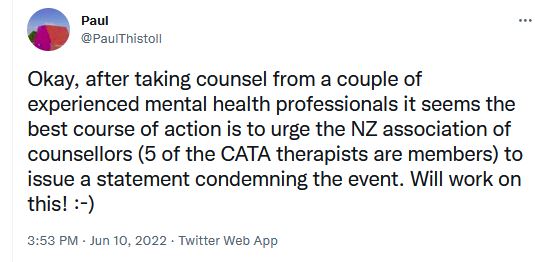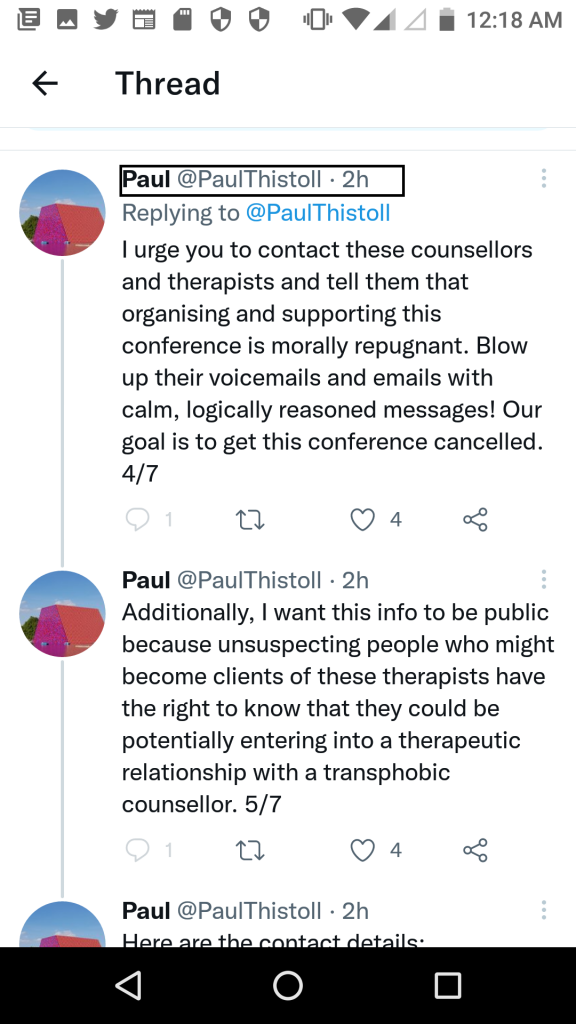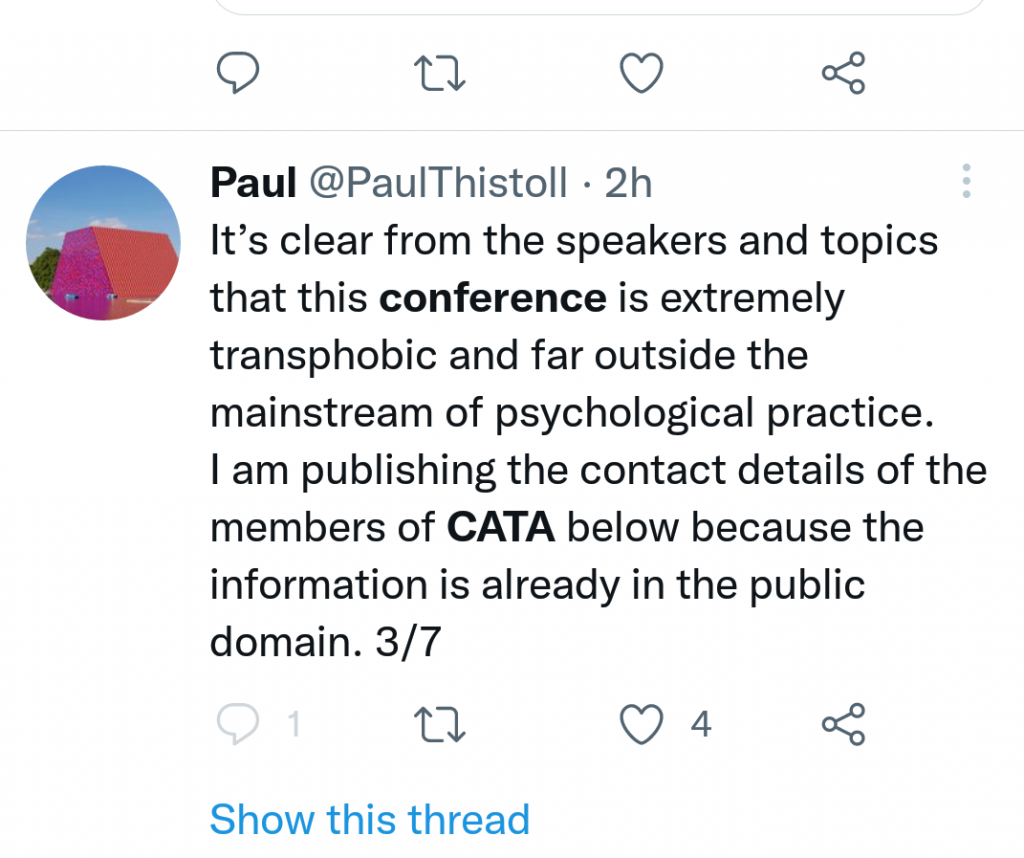The Child and Adolescent Therapists Association (CATA), a small professional group of counsellors and psychotherapists based in Nelson, New Zealand, holds regular professional development conferences. This year the conference topic is
Children, Adolescents and Gender:
Impacts of transgender ideology
There are some great keynote speakers who will discuss amongst other things:
- the explosion in young people reporting a transgender identity;
- the way that would be lesbians and gay men are being directed towards transgender identities; and
- the high proportion of children with autism and trauma offering themselves for gender medicine.
Irish psychotherapist and founder of the parents’ organisation Genspect Stella O’Malley, will speak on
“When reality meets fantasy: the impact of transgenderism on children, parents, and their families”
Dr. Dianna Kenny, former Professor of Psychology, at the University of Sydney, psychologist, psychotherapist and child development expert will present on “Normative development of sex, sexuality and gender in children and teenagers”
On 13 June I became aware that there was increasing pressure being applied to the conference organisers and to the proposed venue to cancel the conference. This campaign was being shared on social media, An online bully outlined the proposed approach to closing down the CATA conference. He released all of the names, phone numbers and email addresses of the CATA members, taking these from an archived version of their website.
The Twitter thread follows:



Since I had corresponded on this issue with New Zealand Association of Counsellors (NZAC) in 2020, I wrote them a letter (available below) intending to provide them with information that would allow them to resist pressure from transactivists to distance the Association from the CATA conference. On 21 June following signficant pressure (see above for a sample of what has been happening) NZAC has thrown its members to the wolves. A media release and letter was sent to all 3200 members of the NZAC that said
NZAC Conversion Practices Position Statement 2022
Te Roopu Kaiwhiriwhiri O Aotearoa, the New Zealand Association of Counsellors (NZAC) with over 3,200 members, is the largest professional Association registering counsellors in Aotearoa. NZAC members uphold high standards of proficiency and ethical practice.
NZAC recognizes that “all humans are born free and equal in dignity and rights” (United Nations, 1948). The New Zealand Association of Counsellors recognizes sexual diversity, including sexual orientation, gender identity and/or gender expression.
NZAC is concerned about the advertised conference, ‘Children, Adolescents and Gender Negative Impacts of Transgender Ideology’ being offered by the ‘Child and Adolescents Therapists Association of Aotearoa New Zealand’ (CATA) in August.
The proposed programme does not appear to be going to reflect best practices in working with transgender or gender-diverse children and adolescents. The presentations as described seem to pathologise transgender people and support conversion-style practices which are unethical, potentially illegal and contrary to the interests, well-being and safety of takatāpui and LGBTQIA+people. NZAC recognises that support for the best outcomes for transgender people, and those who care for them, require culturally appropriate, gender-affirming services.
Young people and their whanau who are seeking therapy are encouraged to find registered counsellors who follow a code of ethics such as NZAC’s.
The New Zealand Association of Counsellors does not condone or support therapeutic interventions, such as ‘Conversion Therapy’, that proactively aim to change a person’s sexual orientation, gender
identity, and/or gender expression.
NZAC considers ‘Conversion Therapy’ to perpetuate social injustice and discrimination while also being ineffectual, potentially very harmful, and not grounded in legitimate therapeutic practice.
Members of the New Zealand Association of Counsellors will be considered in breach of the New Zealand Association of Counsellors Code of Ethics if they provide, refer or recommend someone for ‘Conversion Therapy’.
Any New Zealand Association of Counsellors member who is aware of another member who hasprovided, referred or recommended a client for ‘Conversion Therapy’ is bound by clause 7.2(a) of the Code of Ethics (“Responsibility to NZAC”) to take action in relation to this behaviour. Members of the public may also complain about such a counsellor. They will need to have been a member of the NZAC at the time the alleged behaviour occurred and be still a member, in accordance with the NZAC Complaints Process.
NZAC Conversion Therapy Policy 2020
https://www.nzac.org.nz/…/Conversion-Therapy-2020.pdf
NZAC Code of Ethics
https://www.nzac.org.nz/…/NZAC-Code-of-Ethics-2002…
Gay Puketapu-Andrews
Christine Macfarlane
Te Ahi Kaa President
But one of the main purposes of the conference is to do the very thing that the NZAC is not doing for its members. Counsellors in New Zealand, including school counsellors (as well as teachers and social workers), are not registered health professionals under New Zealand’s Health Registration legislation. This means that when the new Conversion Practices Prohibition Legislation comes fully into effect in August, they will not have the protections afforded to other health professionals working with children. With the kind of transactivism that we have recently seen directed at psychotherapist Dr Az Hakeem in the United Kingdom, we are expecting the same kind of entrapment here.
But the Association is hanging all its members out to dry, not just those who are members of CATA. They are literally be prevented from offering any kind of exploratory counselling without placing themselves at risk of an accusation of conversion therapy, not only by the law but, explicitly by the letter’s demand that colleagues inform on each other. Meanwhile “Rainbow” organisation, InsideOut, has made lesbians and gay youth invisible, with no words to describe themselves, and is telling them they are ‘same-gender’ and not same-sex attracted. This unsupportive approach has a high likelihood of pushing young people inexorably towards a ‘queer’ or ‘trans’ identity. The likely broader effect, as realisation of the legal risks sink in is:
- NZAC’s members simply won’t see kids with gender issues.
- A vulnerable and distressed population will have no expert care
- New Zealand’s already stretched mental health system will be put under even more pressure.
The case for NZAC to align with CATA
I sent the letter below was sent to the New Zealand Association of Counsellors on June 13 when I had become aware of the pressure being applied to them to make them formally disassociate themselves from the CATA conference.
Letter to the New Zealand Association of Counsellors
Dear President,
I am writing to you because I have seen that there have been published online proposals (see above) that seek to pressure your organisation to speak out publicly against the Conference Children, Adolescents and Gender – Negative impacts of transgender ideology that has been organised by the Nelson-based Child and Adolescent Therapists Association (CATA) on August 5. I do apologise for contacting you out of the blue but you may recall that I wrote to you in 2019 [actually 2020] with an article about issues related to transgender medicine in a paper titled ‘Another Unfortunate Experiment’ which I have attached and which outlined the dangers of the affirmative treatment of gender questioning children and young people.
I am writing now to provide some background (in the attached articles and below) to the reasons that I think that the NZAC should not, and does not need to condemn the event. (In fact it I believe it should support the conference as a valuable initiative for your profession). A statement from NZAC that the conference is outside your area of professional practice, as is being alleged, would be to cave into pressure from activists. It would also make it more difficult for NZAC to take a critical stance on the impacts of the legislation as they roll out over the years ahead. It would make it difficult to support NZAC members who are targetted by activists keen to see the legislation in action against ethical therapy as has already happened both here and overseas.
Again I do apologise for my pre-emptive contact on this matter. I do feel NZ mental health services will be best served if this conference is able to go ahead with as few constraints as possible. I’m happy to provide more information or to answer any questions about what I have provided.
Background
The Conversion Pratices Prohibition Bill, which comes into force in August has left members of your organisation, who are not also registered by an organisation that is covered under the Health Practitioners Competence Assurance Act 2003, in an invidious position without the protections afforded to registered health practitioners. [Redaction: Private information provided] The way that the Act is worded means that there is a possibility of a civil legal process of redress or even of imprisonment for counsellors (and even registered health practitioners) if they carry out analytical and diagnostic work with clients related to issues of gender identity. In my view this is counter to the very purpose of counselling. Thus without clarification, when the new law which comes into force in August it could have a chilling effect on counsellors who work with children and in particular those children who are questioning their gender. Counsellors, especially those who specialise in working with children are at particular risk but reducing the practitioners available in an already stressed mental health system would put the wider health care system at risk and push children towards only those counsellors who merely affirm their clients.
Transgender activists in the UK have attempted entrapment of therapists who have attempted to carry out a differential diagnosis and even in New Zealand counsellor Paul Letham has been sacked by Rainbow Youth without consultation in what appears a doctrinaire and high-handed manner over what appear to be his diagnostic and exploratory approaches when Rainbow Youth demand only affirmation.
I’ve attached a couple of recent articles that may inform your decision about this matter. I do hope NZAC is able to resist the pressure to comment publicly on this matter as I feel it would be a retrograde step for counselling in NZ.
Sections 5.1 and 5.2 of the Act itself contain the information about the exclusion and the examples of what constitutes a conversion practice. This article which I wrote for the parents organisation Genspect contains my assessment of the way the law may play out in practice. Here is a recent article making clear that children with gender questioning often come with a multiplicity of factors including co-morbid mental health issues, including same sex attraction, autism and histories of sexual abuse and trauma, as well as evidence of social contagion and heavy use of online resources. As such being able to address root causes is of the utmost importance. An open letter I wrote to the Associate Health Minister Dr Ayesha Verrall updating our 2019 article with information about the way New Zealand’s practice is becoming out of step is attached above .
Your sincerely
Jan Rivers
Independent Researcher on issues of Sex and Gender
Co-author of Sex, Gender and Women’s Rights, Policy Quarterly
Other research relevant to the conference.
The Cass Intermin Review of gender medicince for Children in the UK 2022 Discusses how the NHS should most appropriately assess, diagnose and care for this population of children and young people.
Royal Australasian College of Psychiatrists Position Statement on the mental health needs of people experiencing Gender Dysphoria and Gender Incongruence.
Roberto d Angelo et al One size doesn’t fit all. A critique of affirmation only counselling.

It’s so incredibly unprofessional for an organisation that should always be open to social trends, and how they ebb and flow, to be so obdurately close-minded due to what appears to be fear of those who yell and shout the loudest. It might be timely to remind them that empty vessels make the most noise.